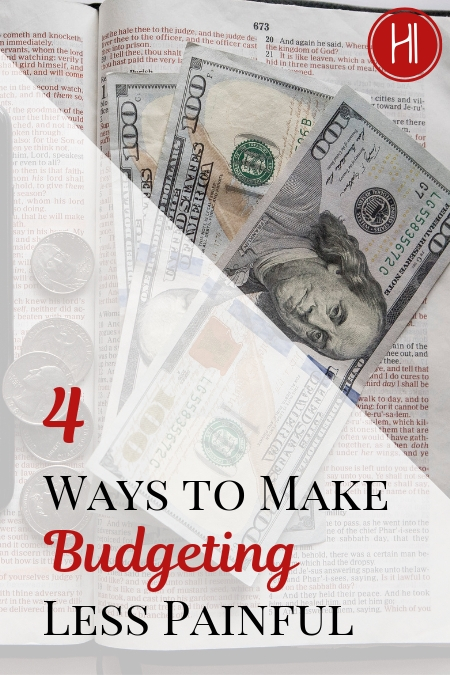4 Ways to Make Budgeting Less Painful
/Budgeting.
Does the thought of routinely tracking your income and expenses make you cringe?
I’m a little unusual in that I LOVE budgeting, at least most of the time! My dad always posted our family’s monthly budget on the refrigerator (much to my mom’s chagrin) where we could all see at a glance how we were doing. Even though my mom frantically flipped over the budget when company came over so that the whole world wasn’t privy to our spending habits, having that budget front and center taught me the importance of “knowing your flocks and herds” and the value that budgeting brought to our family.
And so, when Jon and I got married, I started keeping a detailed budget. For years, I dutifully kept track of our expenses. Some months were pretty hard, as the outgo quickly outpaced the income, but I always knew right where we stood financially even if the situation wasn’t pretty.
A couple of years ago, however, I got really burned out on budgeting, largely due to the frustration of always struggling to make ends meet. Although I haphazardly budgeted, many months I actually didn’t finish tallying our expenditures.
Eventually, though, I realized that half-hearted budgeting attempts weren’t doing us any favors, so I resumed filling out my spreadsheets every month. But I found some fantastic shortcuts that took most of the pain out of budgeting!
Even if financial tracking isn’t your favorite activity, here are 4 ways to make budgeting less painful:
Write down the last day that you updated your budget
I use Google sheets to track my expenses (if you want to see a sample, you can sign up here for our members’ page, where you’ll find some sample budgeting printables), and one thing I’ve learned is that noting on the doc itself the date that I last updated our finances made a huge difference. This way, I know exactly when I left off, and I’m not left scratching my head trying to remember whether or not I’d already tracked that Amazon receipt from last Tuesday.
Budget in rounded numbers
Although I’m currently using exact expenses, one way I’ve kept up with budgeting in the past is to budget in whole dollar amounts. Before all of the perfectionists utter a collective gasp and leave the blog, here me out on this one!
I once read about a wife who only notated whole numbers in her checkbook ledger. For months, she had simply rounded up when the exact amount was over 50 cents and rounded down when it was under. Furious, her husband spent hours painstakingly sorting out their finances, re-entering the exact amounts of each check and expenditure. The results? She’d been off in her calculations by 32 cents in her favor!
Now, I would NEVER recommend anyone balance a checkbook with rounded numbers, but when it comes to budgeting, I think it’s much better to budget with rounded numbers than not to budget at all. So if it’s all the change that’s bugging you, try budgeting with whole numbers and forget about including the change until you’ve gotten into a consistent budgeting routine.
Start with a fixed-expense category
Many finance bloggers recommend that when you’re first starting out with budgeting to begin with your food budget. After all, it’s a category that every family spends money on, and it’s also easier to cut costs on your food bill with the use of coupons.
But I’d recommend starting with what I call a “fixed-expense” category - that is, one where the money spent doesn’t fluctuate every month. Generally speaking, your rent or mortgage, car payment (if you have one), or health insurance premium doesn’t change from month to month. If you’ve never worked with a budget before, begin by consistently keeping track of fixed expenses. Once you’re more comfortable noting these fixed expenses, you can move on to the flexible categories like food, gas, and utilities.
Budget frequently
There’s nothing worse than putting off a job until it becomes an overwhelming endeavor. The same is true with budgeting. Even for someone like me who actually likes crunching numbers and inputting data, when I put off my budgeting tasks, they become overwhelming. One big key to making budgeting less painful is to do it frequently.
How often should you work on your budget? There isn’t a one-size-fits-all answer for this, but my recommendation is to budget no less than once a week. And if you’re really struggling with budgeting or keeping your spending under control, I would advise you to update your budget daily. Yes, daily! One big bonus of daily budgeting is that it should only take a few minutes.
Budgeting might not make your top-10 list of favorite activities, but there are several ways to make it less painful. By writing down the last time you budgeted, budgeting in round numbers, starting with fixed expenses, and budgeting frequently, you may find that you actually begin to enjoy stewarding your finances!








